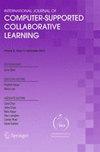The role of first-language heterogeneity in the acquisition of online interaction self-efficacy in CSCL
IF 4.2
2区 教育学
Q1 EDUCATION & EDUCATIONAL RESEARCH
International Journal of Computer-Supported Collaborative Learning
Pub Date : 2023-11-11
DOI:10.1007/s11412-023-09411-2
引用次数: 0
Abstract
Abstract The acquisition of online interaction competencies is an important learning objective. The present study explored the relationships between the first-language heterogeneity of computer-supported collaborative learning (CSCL) groups and the development of students’ online interaction self-efficacy via a pretest–posttest design in the context of a nine-week CSCL course. The research participants were 1525 freshmen receiving distance education who were randomly assigned to 343 CSCL groups. Independent of their own language status, students in CSCL groups featuring first-language heterogeneity exhibited lower precourse–postcourse gains in online interaction self-efficacy than students in groups without heterogeneity. Consistent with a theoretically derived moderation model, the relationships between first-language heterogeneity and self-efficacy gains were moderated by the amount of time that the groups spent on task-related communication during the initial collaboration phase (i.e., the relationships were significant when little time was spent on it but not when a great deal of time was spent on it). In contrast, the amount of time that groups spent on communication related to getting to know each other was ineffective as a significant moderator. Follow-up analyses indicated that time spent getting to know each other in first-language heterogeneous CSCL groups seems to have had the paradoxical effect of increasing rather than decreasing perceptions of heterogeneity among group members. Apparently, this effect impaired online interaction self-efficacy gains.

母语异质性在CSCL在线互动自我效能习得中的作用
在线互动能力的习得是一个重要的学习目标。本研究以九周的计算机支持协作学习课程为研究对象,采用前测后测设计,探讨计算机支持协作学习(CSCL)小组第一语言异质性与学生在线互动自我效能的关系。研究对象为1525名接受远程教育的大一新生,随机分为343个CSCL组。与自身语言状况无关,具有母语异质性的CSCL学生在课前-课后在线互动自我效能感的提升低于无母语异质性的CSCL学生。与理论推导出的调节模型一致,第一语言异质性和自我效能提高之间的关系被小组在初始合作阶段用于任务相关沟通的时间量所调节(即,当花费时间很少时,这种关系显着,而当花费时间很多时,这种关系就不显着)。相比之下,小组花在相互了解的交流上的时间作为一个重要的调节因素是无效的。后续分析表明,在母语异质的CSCL群体中,花在相互了解上的时间似乎产生了一种矛盾的效果,即增加而不是减少了群体成员之间的异质感。显然,这种影响削弱了在线互动的自我效能感。
本文章由计算机程序翻译,如有差异,请以英文原文为准。
求助全文
约1分钟内获得全文
求助全文
来源期刊
CiteScore
8.00
自引率
18.60%
发文量
20
期刊介绍:
An official publication of the International Society of the Learning Sciences, the International Journal of Computer-Supported Collaborative Learning (IJCSCL) fosters a deep understanding of the nature, theory, and practice of computer-supported collaborative learning (CSCL). The journal serves as a forum for experts from such disciplines as education, computer science, information technology, psychology, communications, linguistics, anthropology, sociology, and business. Articles investigate how to design the technological settings for collaboration and how people learn in the context of collaborative activity.

 求助内容:
求助内容: 应助结果提醒方式:
应助结果提醒方式:


